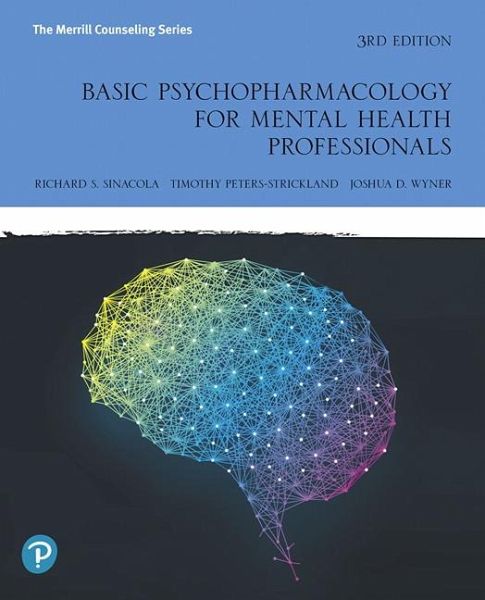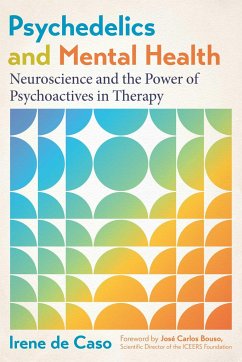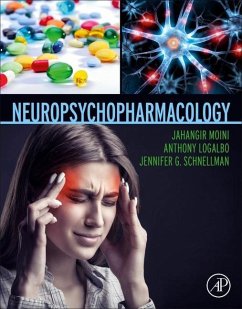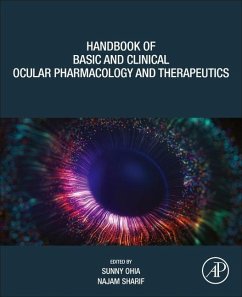
Basic Psychopharmacology for Mental Health Professionals
Versandkostenfrei!
Versandfertig in über 4 Wochen

PAYBACK Punkte
46 °P sammeln!




An easy-to-understand guide to psychopharmacology for non-medical helping professionals Basic Psychopharmacology for Mental Health Professionals provides up-to-date information on the latest medications in easy-to-understand language. This practical and engaging text includes numerous case studies that illustrate the skills needed for successful practice in the field. The 3rd Edition is updated to the DSM-5, and it includes updated information and research on the newest medications. Additional clinical case examples have also been added throughout the text.
About our authors Richard S. Sinacola, PhD, a licensed psychologist, is a Lecturer, Department of Psychology, California State University, Los Angeles. He is an Adjunct Full Professor and former Chair of Clinical Psychology at the Chicago School of Professional Psychology in Los Angeles, an Adjunct Professor of psychology and MFT at Brandman University, and an Adjunct Professor of theology and pastoral counseling at St. Clement Seminary. He maintains a private consulting and psychology practice in Pasadena and the Palm Springs area and currently serves as the APA curriculum consultant for Audio Digest Corporation in Glendale. He served as the former Director of Psychology Programs for Chapman University in Palm Desert and was the former Chair of Counseling and Addiction Studies at the University of Detroit Mercy. He has served on the editorial board of the Michigan Journal of Counseling and Development, and he is the past secretary of the Michigan Psychological Association. He holds degrees in psychology, counseling, clinical social work, and theology from the University of Detroit, Wayne State University, and St. Clement Seminary. Timothy Peters-Strickland, MD, is Vice President, Global Clinical Development, CNS and Digital Medicine, at Otsuka Pharmaceutical Development and Commercialization. He was former Medical Director in Neuroscience at Covance in Princeton and conducts clinical research in the mental health field. Dr. Peters-Strickland has held an appointment as a clinical instructor with the University of Southern California. He is a diplomate of the American Board of Psychiatry and Neurology with an added qualification in Addiction Psychiatry. Dr. Peters-Strickland obtained his medical degree from the University of Florida after obtaining a BA in Biochemistry from Florida State University. He completed his psychiatric residency at the University of Southern California. Joshua D. Wyner, PhD, is an Associate Professor and Interim Department Chair of Marriage and Family Therapy at the Chicago School of Professional Psychology in Los Angeles. He maintains a private practice as a Licensed Marriage and Family Therapist in Los Angeles and serves as an outside supervisor for the Maple Counseling Center. He was the Psychophysiology Lab Manager for the USC Twin Project, a multi-decade longitudinal study that examines the genetics of psychopathology and related behaviors. He has also worked with USC's Optical Materials and Devices Laboratory, developing hardware for retinal prosthetics. Dr. Wyner holds degrees in Clinical Neuroscience, Electrical Engineering, and Marriage and Family Therapy from the University of Southern California.
Produktdetails
- Verlag: Pearson Education
- 3rd edition
- Seitenzahl: 208
- Erscheinungstermin: 8. April 2019
- Englisch
- Abmessung: 231mm x 185mm x 5mm
- Gewicht: 363g
- ISBN-13: 9780134893648
- ISBN-10: 0134893646
- Artikelnr.: 57032499
Herstellerkennzeichnung
Libri GmbH
Europaallee 1
36244 Bad Hersfeld
gpsr@libri.de
Für dieses Produkt wurde noch keine Bewertung abgegeben. Wir würden uns sehr freuen, wenn du die erste Bewertung schreibst!
Eine Bewertung schreiben
Eine Bewertung schreiben
Andere Kunden interessierten sich für











